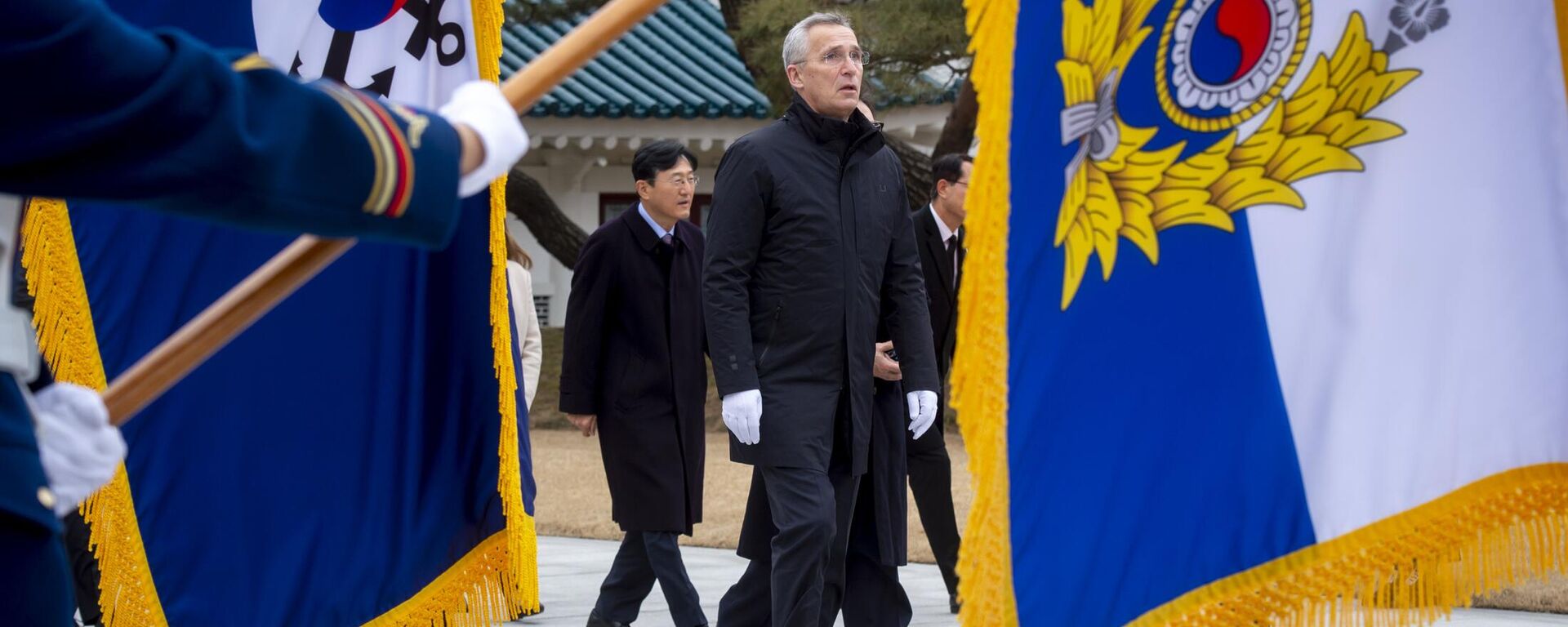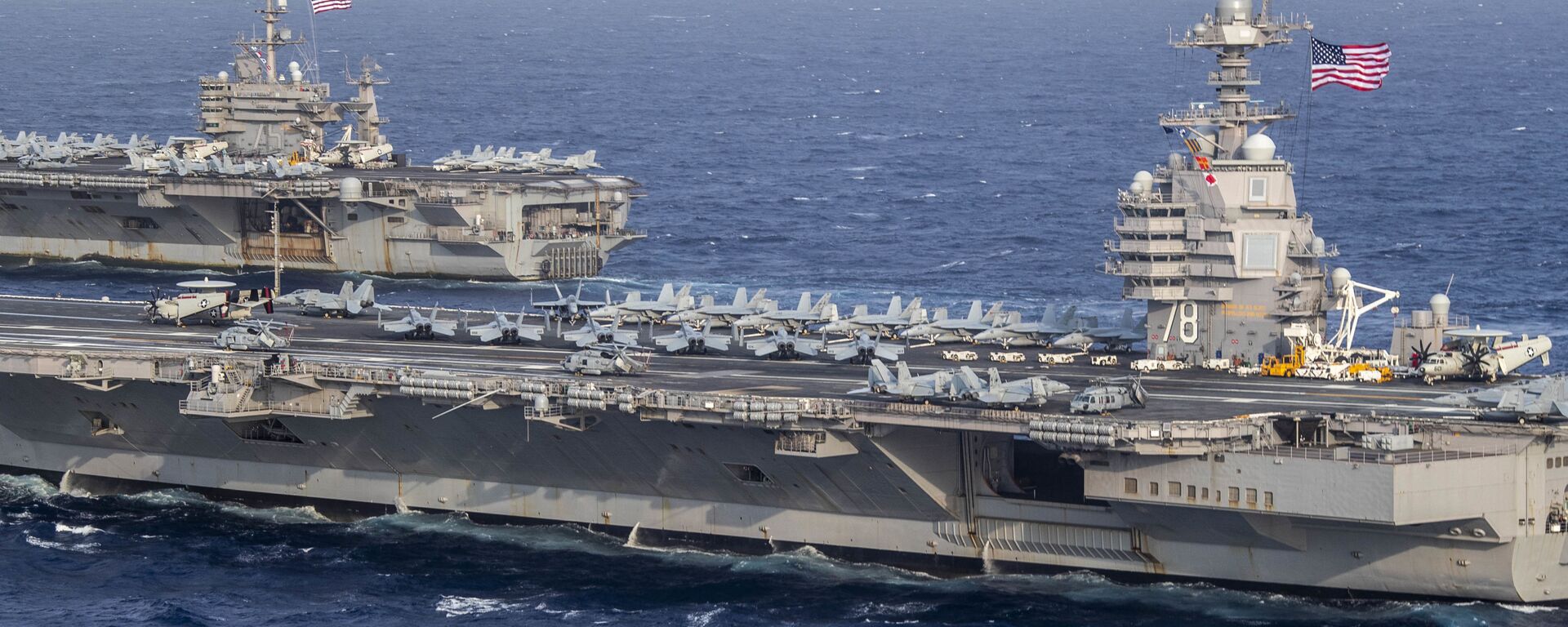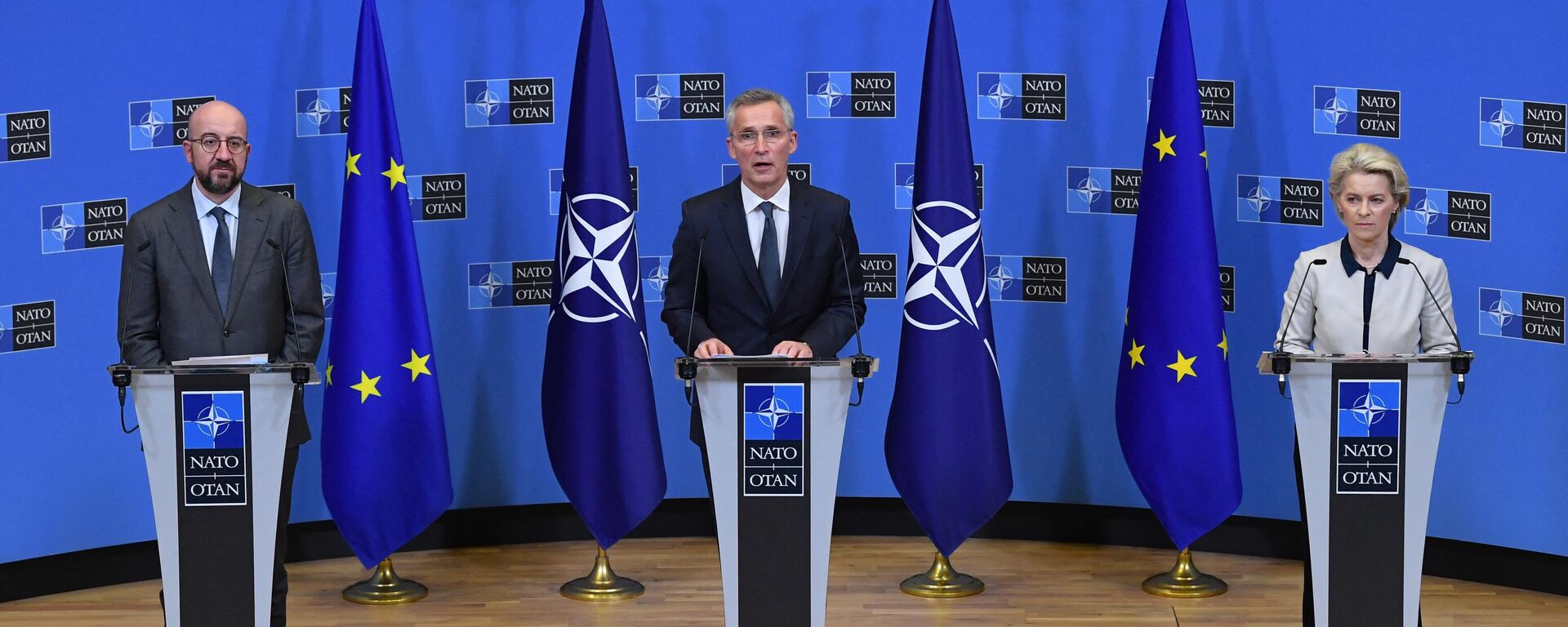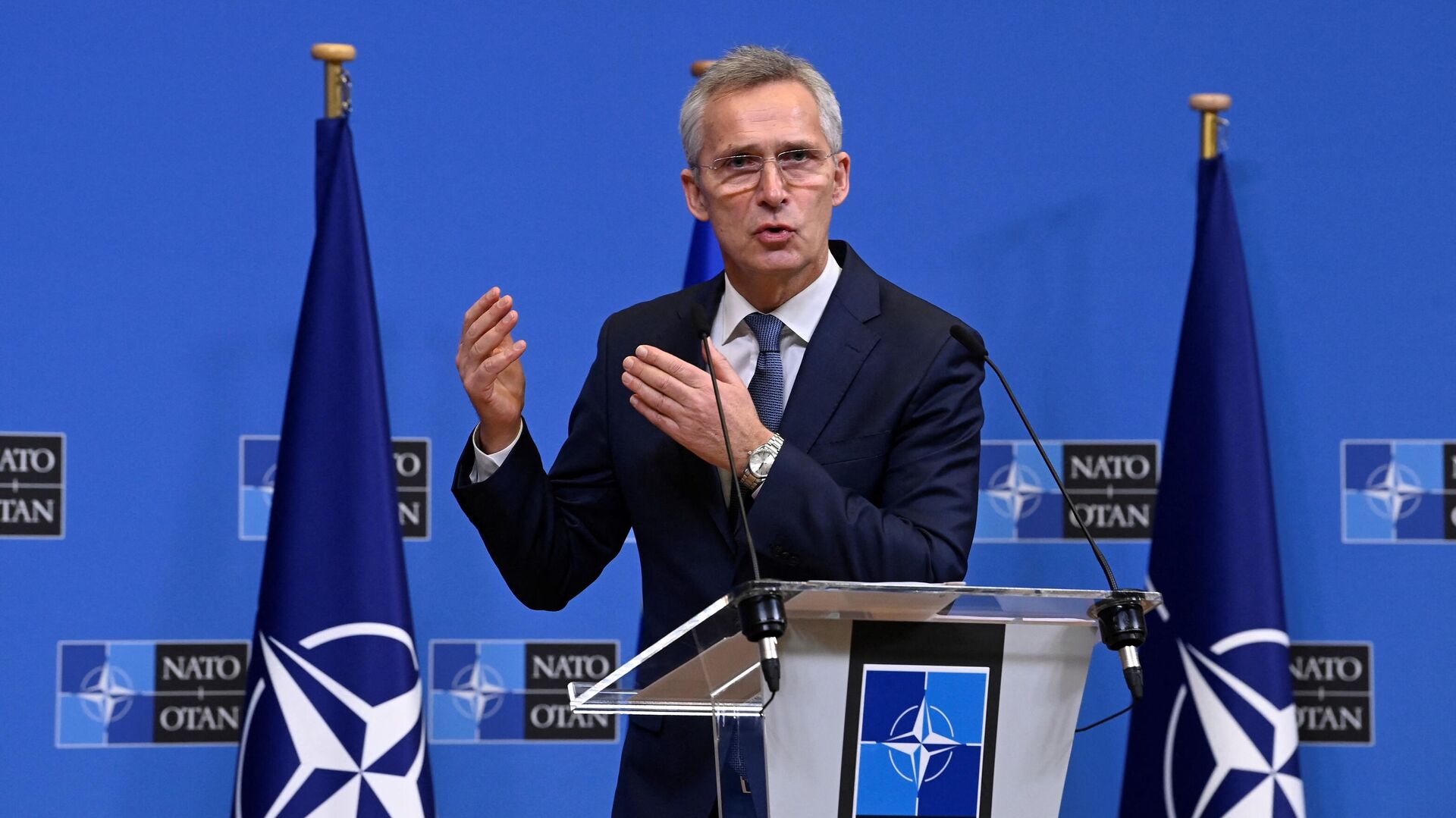https://sputnikglobe.com/20230209/how-us-using-nato-to-pressure-china-and-force-europe-to-fork-out-1107278914.html
How US Using NATO to Pressure China and Force Europe to Fork Out
How US Using NATO to Pressure China and Force Europe to Fork Out
Sputnik International
NATO Secretary General Jens Stoltenberg called upon the bloc's members to provide more weapons for Kiev on February 8, also accusing China of boosting its... 09.02.2023, Sputnik International
2023-02-09T19:02+0000
2023-02-09T19:02+0000
2023-04-13T12:45+0000
analysis
us
nato
china
jens stoltenberg
asia-pacific region
ukraine
military-industrial complex
energy crisis
proxy war
https://cdn1.img.sputnikglobe.com/img/07e7/01/10/1106388958_0:144:3131:1905_1920x0_80_0_0_c0f7eaf072a689533533c3097d69a446.jpg
"On the one hand, NATO continues to demand that member states increase military spending and build up military power, and on the other hand, it makes irresponsible remarks about China. This is a typical example of double standards. China adheres to the path of peaceful development and is the country with the best record in terms of peace and security," Chinese Foreign Ministry spokesperson Mao Ning told Sputnik.According to Mao, NATO should "abandon its Cold War mentality and ideological prejudices and seriously think about the role it has played in the stability of Europe and the world, instead of fomenting conflicts everywhere and exaggerating the threat of China."During the February 8 joint presser with US Secretary of State Antony J. Blinken, Stoltenberg portrayed imminent "threats" allegedly posed by Russia and China. The NATO chief warned that Russia's victory "would also be dangerous for all of us" especially given that Beijing was "closely watching" the situation in Europe."China is substantially building up its military forces," Stoltenberg said. "It is attempting to assert control over the South China Sea, and threatening Taiwan. Trying to take control of critical infrastructure, including in NATO countries (…) And deepening its strategic partnership with Moscow," he alleged.In order to counter the aforementioned threats, NATO countries must further increase defense spending, emphasized Stoltenberg.US Use NATO as Tool to Pressure ChinaStoltenberg's rhetoric should be seen in the context of unfolding Sino-American tensions over a wide range of issues, starting with the Biden administration's semiconductor restrictions and ending with Washington's Taiwan provocations.To cap it off, Secretary of State Blinken suspended his visit to Beijing over the Chinese weather balloon detected in US airspace ahead of Blinken's China trip. US policy-makers dubbed the airship a "surveillance" device despite the Chinese insisting that the meteorological balloon merely lost its way.The US appears to be interested in ramping up the anti-China sentiment and is using NATO as a tool to increase pressure on Beijing, according to Gong Hongle, associate professor at the Institute of International Relations, Nanjing University.The US is pushing NATO to enhance its infrastructure in the Asia Pacific because Washington's Squad and AUKUS partnerships are not comparable in terms of organization and effectiveness with the transatlantic bloc, according to Professor Dmitry Mosyakov, head of the Center for Southeast Asia, Australia and Oceania at the Institute of Oriental Studies.Mosyakov stressed that the decision regarding the bloc's infrastructure in Asia was made at the NATO summit in Madrid in May 2022. The alliance particularly announced that it would expand its activities in northeast Asia, where the Okhotsk, Bering and Japanese Seas are located, he added.At the same time, it appears unlikely that an all-out conflict akin to that in Ukraine, will emerge anytime soon in the Asia Pacific, according to the Russian professor.David Nazar Coutino, a lecturer specializing in China, Oriental and African studies at the Colegio de México, echoed Mosyakov. Despite Stoltenberg's warnings about Beijing's military buildup, "no reasonable person" is looking for a war in which China and the US – two nuclear powers – will confront each other given the risk of mutual destruction. Coutino insisted that it was too early to talk about the possibility of Sino-American tensions translating into a direct military conflict.US Keeps Poking China Over TaiwanAt the same time, however, US policy-makers on both sides of the aisle are seemingly raising the stakes over Taiwan, which is seen by Beijing as an inalienable part of the People's Republic.On multiple occasions, President Joe Biden claimed that the US is ready to "protect" Taiwan "militarily" from Beijing, something that was repeatedly downplayed by the White House. Earlier, then-House Speaker Nancy Pelosi visited Taiwan despite warnings from the Chinese leadership. Recently, new House Speaker Kevin McCarthy has signaled that he is ready to follow in his predecessor's footsteps.One might wonder as to why Washington is poking China over Taiwan at a time when its military industrial complex is busy fuelling the Ukraine conflict.US Boosting Its Economy at Europe's ExpenseWhile the US is trying to flex its muscle in Europe and Asia at one and the same time, Navy Secretary Carlos Del Toro was cited last month as saying that it may soon become challenging for the US to continue to arm itself and provide weapons to Kiev.In her previous interview with Sputnik, Kwiatkowski explained that the US and European manufacturers are not "able and will not be able for several years to produce the ammo and equipment and systems at the rate the Ukrainian 'blood pump' is consuming those resources."To complicate matters further, the EU is seeing cuts in its industrial output due to the energy crunch, economic slowdown and looming recession. EU businesses are moving outside Europe seeking cheap energy and favorable conditions."The slow de-industrialization of Europe hasn't helped it become a major source of the world's weapons systems - although a number of governments led and subsidized air and sea projects have produced excellent aircraft, submarines, ships," said Kwiatkowski. "NATO countries have each produced their own national systems (in part as defense is a heavily subsidized white collar welfare sector), and European Union countries have over 175 unique major weapons systems – compared to 30 for the US. Already Germany and other countries have felt the strain of just supplying Ukraine - and for a recipient country at war or near war to effectively integrate the variety of weapons systems seamlessly on a battlefield under duress is really not possible."At the same time, there's something fundamentally wrong with the way in which the US spends its defense budget, according to Chas Freeman, a visiting scholar at the Watson Institute for International and Public Affairs at Brown University and former assistant secretary of defense for international security affairs from 1993-94. "We have a tendency to be on a cost-plus basis, to just funnel money into the defense contractors and they produce weapon systems which have every bell and whistle you can imagine on them to the point where sometimes they're not very reliable," Freeman told Sputnik. "You can look at the example of the F-35, which is the latest all-purpose fighter aircraft, which apparently has hundreds of design flaws and most of the time can't fly. We have reduced defense companies, contractors to the level where they are oligopolies that are only five or so, the big ones. And that means there's not much competition. And without competition, as we know from the experience of capitalism, without competition, prices rise and efficiency declines."Presently, US-NATO rhetoric about the double Russo-China threat appears to be a way to improve Washington's economic opportunities, according to the former DoD analyst.
https://sputnikglobe.com/20230130/stoltenbergs-asia-trip-highlights-nato-appetite-for-global-anti-china-anti-russia-bloc-scholars-1106833507.html
https://sputnikglobe.com/20230131/dual-containment-of-moscow-beijing-is-mission-impossible-for-washington-taiwan-expert-says-1106864934.html
https://sputnikglobe.com/20230111/eu-nato-unity-only-ink-on-paper-as-members-lose-grip-analysts-say-1106231674.html
china
ukraine
Sputnik International
feedback@sputniknews.com
+74956456601
MIA „Rosiya Segodnya“
2023
News
en_EN
Sputnik International
feedback@sputniknews.com
+74956456601
MIA „Rosiya Segodnya“
Sputnik International
feedback@sputniknews.com
+74956456601
MIA „Rosiya Segodnya“
stoltenberg-blinken presser, nato secretary general stoltenberg, russian special military operation in ukraine, nato expansion in asia, china's military buildup, taiwan island, south china sea dispute, can us take on china and russia simultaneously, eu energy crunch, us military industrial complex
stoltenberg-blinken presser, nato secretary general stoltenberg, russian special military operation in ukraine, nato expansion in asia, china's military buildup, taiwan island, south china sea dispute, can us take on china and russia simultaneously, eu energy crunch, us military industrial complex
How US Using NATO to Pressure China and Force Europe to Fork Out
19:02 GMT 09.02.2023 (Updated: 12:45 GMT 13.04.2023) NATO Secretary General Jens Stoltenberg called upon the bloc's members to provide more weapons for Kiev on February 8, also accusing China of boosting its military capabilities in the Asia Pacific. "What happens in Europe today could happen in Asia tomorrow," forecast the NATO chief.
"On the one hand, NATO continues to demand that member states increase military spending and build up military power, and on the other hand, it makes irresponsible remarks about China. This is a typical example of double standards. China adheres to the path of peaceful development and is the country with the best record in terms of peace and security," Chinese Foreign Ministry spokesperson Mao Ning told Sputnik.
According to Mao, NATO should "abandon its Cold War mentality and ideological prejudices and seriously think about the role it has played in the stability of Europe and the world, instead of fomenting conflicts everywhere and exaggerating the threat of China."
During the February 8 joint presser with US Secretary of State Antony J. Blinken, Stoltenberg portrayed imminent "threats" allegedly posed by Russia and China. The NATO chief warned that Russia's victory "would also be dangerous for all of us" especially given that Beijing was "closely watching" the situation in Europe.
"China is substantially building up its military forces," Stoltenberg said. "It is attempting to assert control over the South China Sea, and threatening Taiwan. Trying to take control of critical infrastructure, including in NATO countries (…) And deepening its strategic partnership with Moscow," he alleged.
In order to counter the aforementioned threats, NATO countries must further increase defense spending, emphasized Stoltenberg.

30 January 2023, 18:57 GMT
US Use NATO as Tool to Pressure China
Stoltenberg's rhetoric should be seen in the context of unfolding Sino-American tensions over a wide range of issues, starting with the Biden administration's semiconductor restrictions and ending with Washington's Taiwan provocations.
To cap it off, Secretary of State Blinken suspended his visit to Beijing over
the Chinese weather balloon detected in US airspace ahead of Blinken's China trip. US policy-makers dubbed the airship a "surveillance" device despite the Chinese insisting that the meteorological balloon merely lost its way.
The US appears to be interested in ramping up the anti-China sentiment and is using NATO as a tool to increase pressure on Beijing, according to Gong Hongle, associate professor at the Institute of International Relations, Nanjing University.
The United States has gradually turned NATO into its own instrument. In the context of tense geopolitical relations between China and the United States, the US, with the help of NATO, began to meddle in security affairs in the Asia-Pacific region. Over the past two years, NATO has interacted more than ever with US allies in Asia, for example by sending official delegations to Japan and South Korea, and often blaming China.
Gong Hongle
Associate professor at the Institute of International Relations, Nanjing University.
The US is pushing NATO to enhance its infrastructure in the Asia Pacific because Washington's Squad and AUKUS partnerships are not comparable in terms of organization and effectiveness with the transatlantic bloc, according to Professor Dmitry Mosyakov, head of the Center for Southeast Asia, Australia and Oceania at the Institute of Oriental Studies.
Mosyakov stressed that the decision regarding the bloc's infrastructure in Asia was made at the NATO summit in Madrid in May 2022. The alliance particularly announced that it would expand its activities in northeast Asia, where the Okhotsk, Bering and Japanese Seas are located, he added.
At the same time, it appears unlikely that an all-out conflict akin to that in Ukraine, will emerge anytime soon in the Asia Pacific, according to the Russian professor.
"The Americans have long been trying to organize such a conflict in Asia," Mosyakov told Sputnik. "They have been wooing Vietnam for a long time, trying in every possible way to use contradictions pertaining to the South China Sea, and other issues (…) However, they are not succeeding, because the Vietnamese leadership is not going to become completely dependent on the United States and follow American instructions."
David Nazar Coutino, a lecturer specializing in China, Oriental and African studies at the Colegio de México, echoed Mosyakov. Despite Stoltenberg's warnings about Beijing's military buildup, "no reasonable person" is looking for a war in which China and the US – two nuclear powers – will confront each other given the risk of mutual destruction. Coutino insisted that it was too early to talk about the possibility of Sino-American tensions translating into a direct military conflict.

31 January 2023, 18:52 GMT
US Keeps Poking China Over Taiwan
At the same time, however, US policy-makers on both sides of the aisle are seemingly raising the stakes over Taiwan, which is seen by Beijing as an inalienable part of the People's Republic.
On multiple occasions, President Joe Biden claimed that the US is ready to "protect" Taiwan "militarily" from Beijing, something that was repeatedly downplayed by the White House. Earlier, then-House Speaker Nancy Pelosi visited Taiwan despite warnings from the Chinese leadership. Recently, new House Speaker Kevin McCarthy has signaled that he is ready to follow in his predecessor's footsteps.
One might wonder as to why Washington is poking China over Taiwan at a time when its military industrial complex is busy fuelling the Ukraine conflict.
"Curiously, both Ukraine and Taiwan do not have defense treaties with the US - Ukraine is not a NATO member, and the official US policy is the recognition of the PRC as China, not Taiwan," retired Lt. Col. Karen Kwiatkowski, a former analyst for the US Department of Defense, told Sputnik. "Yet we see a somewhat desperate insistence that the US military and the US taxpayer will pay to ensure a hot war develops over the territories of both these countries. Washington's desperation for holding and creating defense markets in Ukraine and Taiwan also comes at a time where half or more of the people and political parties in those countries do not want war over their territory."

11 January 2023, 18:14 GMT
US Boosting Its Economy at Europe's Expense
While the US is trying to flex its muscle in Europe and Asia at one and the same time, Navy Secretary Carlos Del Toro was cited last month as saying that it may soon become challenging for
the US to continue to arm itself and provide weapons to Kiev.
In her previous interview with Sputnik, Kwiatkowski explained that
the US and European manufacturers are not "able and will not be able for several years to produce the ammo and equipment and systems at the rate the Ukrainian 'blood pump' is consuming those resources."
To complicate matters further, the EU is seeing cuts in its industrial output due to the energy crunch, economic slowdown and looming recession. EU businesses are moving outside Europe seeking cheap energy and favorable conditions.
"The slow de-industrialization of Europe hasn't helped it become a major source of the world's weapons systems - although a number of governments led and subsidized air and sea projects have produced excellent aircraft, submarines, ships," said Kwiatkowski.
"NATO countries have each produced their own national systems (in part as defense is a heavily subsidized white collar welfare sector), and European Union countries have over 175 unique major weapons systems – compared to 30 for the US. Already Germany and other countries have felt the strain of just supplying Ukraine - and for a recipient country at war or near war to effectively integrate the variety of weapons systems seamlessly on a battlefield under duress is really not possible."
At the same time, there's something fundamentally wrong with the way in which the US spends its defense budget, according to Chas Freeman, a visiting scholar at the Watson Institute for International and Public Affairs at Brown University and former assistant secretary of defense for international security affairs from 1993-94.
"We have a tendency to be on a cost-plus basis, to just funnel money into the defense contractors and they produce weapon systems which have every bell and whistle you can imagine on them to the point where sometimes they're not very reliable," Freeman told Sputnik. "You can look at the example of the F-35, which is the latest all-purpose fighter aircraft, which apparently has hundreds of design flaws and most of the time can't fly. We have reduced defense companies, contractors to the level where they are oligopolies that are only five or so, the big ones. And that means there's not much competition. And without competition, as we know from the experience of capitalism, without competition, prices rise and efficiency declines."
Presently, US-NATO rhetoric about the double Russo-China threat appears to be a way to improve Washington's economic opportunities, according to the former DoD analyst.
"As after WWI and WWII, US corporations with US government assistance will look for 'fire sale' investment opportunities on the European continent to produce US weapons systems, in the name of standardization on a global Sino-Russian battlefield," she concluded.







